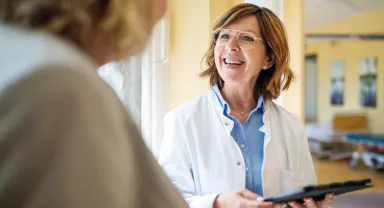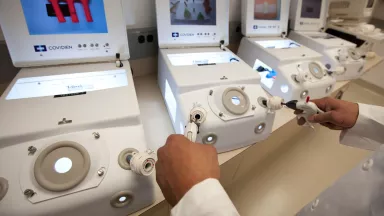Introduction
Our world-renowned orthopedic surgeons and orthopedists are experts in their fields with specialized training to provide the optimal diagnosis and treatment for a range of orthopedic conditions. We are internationally recognized for delivering the highest-quality orthopedic care to our patients.
What is lumbar spondylosis?
Spondylosis is an age-related change of the bones (vertebrae) and discs of the spine. These changes are often called degenerative disc disease and osteoarthritis. When this condition is in the lower back, it is called lumbar spondylosis. These changes do not always cause symptoms. But they are a common cause of spine problems that can range from mild to severe.
What causes it?
As your body ages, the discs between the bones of the spine become stiffer and can break down. The bones also wear down and can grow bone spurs.
What are the symptoms?
There are often no symptoms. But when symptoms occur, back pain and stiffness are the main ones. They are usually worse in the morning and get better throughout the day. If bony growths are pushing against a nerve root or the spinal cord, you may have numbness, tingling, weakness, or an aching, shooting pain in your buttock and leg.
How is it diagnosed?
Lumbar spondylosis can usually be diagnosed based on your history of symptoms, a physical exam and imaging tests. These are tests that produce various kinds of pictures of your body. They include:
- X-ray, which can help measure the extent of osteoarthritis or injuries to the bones
- MRI, which checks your spinal nerves and looks for disc problems
- CT scan, which checks your spinal canal, bones and joints
How is it treated?
Pain and stiffness are first treated with ice or heat and over-the-counter medicines. Physical therapy and daily exercises can be helpful.
If these treatments are not helping enough, you may need other treatments. This might be more likely to happen if you have spine problems such as a herniated disc or spinal stenosis. In some cases, an injection of medicine in the joint area may offer short-term relief. For a severe problem, surgery may be an option.
Physician Referrals
Montefiore Einstein embraces a collaborative approach.
If you have a patient who could benefit from our services, please reach out.
718-920-2060
Schedule a Visit
Have a general question or concern?
We’re available to help you by phone or email.
• 718-920-2060 • orthofeedback@montefiore.org






